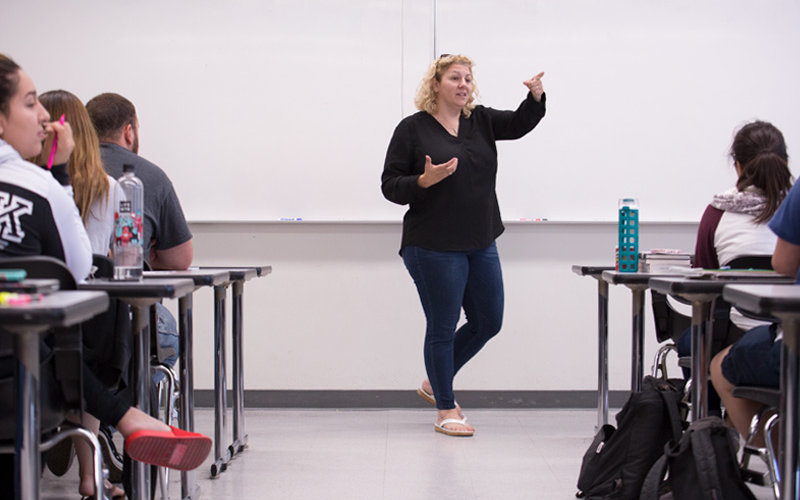
Summer Young, a student working toward a career as a prosecutor, was intrigued by the title of a criminal justice class at Cal State Fullerton: “Sex, Crime and Culture.”
“This is a topic that many tend to shy away from,” said Young, who took the course over the summer. “There are too many stereotypes that cloud our judgment of what a person who sexually perpetrates looks and acts like.”
The course is led by Alissa Ackerman, an assistant professor of criminal justice and sex crimes researcher who has been teaching the subject for nearly 10 years. To give students a balanced perspective, she invites several guest speakers to the class to share their personal and professional insights.
“Speakers run the gamut from survivor to prosecutor to perpetrator to treatment provider — you name it and they’re coming into this class,” said Ackerman. “What I tell students from day one is that at the end of the day, regardless of what I present, they have to make their own decisions and they have to come up with their own opinions.”
“As the course unfolds, you begin to understand situations from eye-opening perspectives,” said Mitchell Fruto, a psychology and criminal justice double major who plans to pursue a career in forensic psychology. “Dr. Ackerman is known for her discussion-based classes, where all types of voices are heard and put into context. She provides a safe space for students to discuss difficulties in relation to the criminal justice system.”
Ackerman, who has written extensively on sex offender policy and practice, believes current policies do little to help rehabilitate people who have offended and to help people who have experienced sexual violence.
“Our policies are very reactionary; they don’t really do anything to prevent these crimes from happening and they take the person who’s been harmed right out of the equation,” said Ackerman.
She is a proponent of restorative justice, a framework that focuses on the harm caused by sexual abuse, harassment or violence rather than the criminal statute. “No matter what somebody has done, no matter what somebody has experienced, their voice is important in understanding why it happens and what survivors need,” said Ackerman.
To illustrate this point, Ackerman invites Tom Stranger, who is based in Australia, to speak to her class via video chat. Through an eight-year process of restorative justice, Stranger took full responsibility for the rape of a former girlfriend. The pair have since delivered a TED Talk on “Our Story of Rape and Reconciliation” that has garnered more than 4.5 million views and co-authored a book called “South of Forgiveness.”
“This is an issue that’s occurring behind many closed doors, deep in shame and stigma,” explained Stranger. “I wanted to put it out there in hopes that it would resonate with people — certainly understanding that it was not going to be received well by many and also understanding that it might allow some to consider the idea that you can take ownership and it can be a powerful step.”
Through her research and time spent with 375 men and women who have committed acts of sexual harm, Ackerman explains that the emotions they feel about their actions and the emotions survivors feel about what has been done to them are almost identical.
“Oftentimes you will hear survivors talk about drug and alcohol use and abuse, anxiety and depression, feelings of shame and guilt, self-harm — those are almost identical to what you hear from people who have caused harm, when they realize they have caused harm.
“We’re a lot more similar than we are different,” said Ackerman, herself a rape survivor. “But people like to dichotomize us. We’re either with survivors or we’re against them. I think that’s misinformed. When we acknowledge our common humanity, we can begin to end sexual harm.”